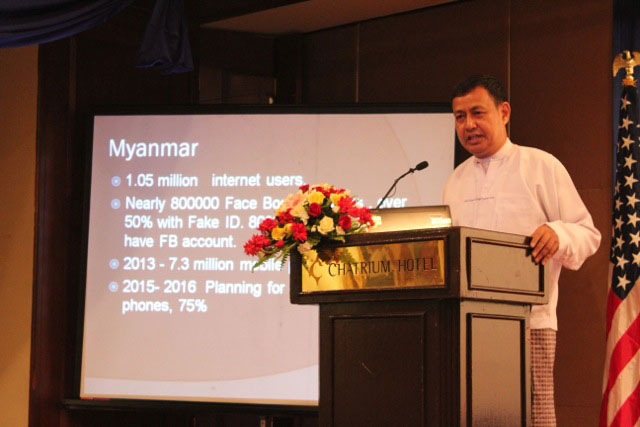Myanmar Presidential spokesman Ye Htut addresses a seminar on Hate Speech organised by the US embassy in Yangon on Friday, June 28, 2013.
 Myanmar’s Deputy Minister of Information Ye Htut said on Friday that “media literacy” needs to be developed to stop hate speech on social media from being the main source of people’s information, particularly in regards to religious conflicts.
Myanmar’s Deputy Minister of Information Ye Htut said on Friday that “media literacy” needs to be developed to stop hate speech on social media from being the main source of people’s information, particularly in regards to religious conflicts.
He cited the case of the Lashio mosque burning earlier this year, saying, “People want news fast, and they could not wait, so they just went straight to Facebook.” Speaking at a Hate Crime workshop hosted by the US Embassy in Yangon on Friday morning, he said that the Rakhine conflict was reported on in a way that “caused more conflict than peace.”
Ye Htut also hinted that an online Complaint Center would be established by the government, whereby people could report instances of online hate speech.
“We think media should go digital, and our department is willing to develop regulators and public service media training for that,” said Ye Htut. “We have to ensure people have freedom on the Internet, but we have to balance that.
“The government has no intention of blocking people, but we are ready to stop people who are diverting from the law,” he emphasized.
Ye Htut’s comments paralleled those released by President Thein Sein in his reaction to the TIME cover, claiming that “journalism ethics should be reviewed in Myanmar,” and that the private media “should be writing articles that promote peace not anger.”
Ambassador Derek Mitchell said that free speech in Myanmar is “just as much about responsibility as freedom,” and that for the elimination of hate speech, there needs to be “more speech, not less.”
Following the TIME cover article of June 1, several groups in the country are asking where the line of hate speech can be drawn. On Wednesday, activist group Reporters Without Borders said they were “appalled” by the government’s endorsement of the ban on the June 1 magazine edition. Both Mitchell and Ye Htut noted that it was a complicated process, and that it is important no religious or ethnic group is left out of the process.
Ye Htut’s suggested that the answer to regulating hate speech is in training media professionals to produce fast and ethical news that can be viewed online before audiences turn to social media. He cited the massive increase in Facebook users in Myanmar following the relaxing of internet laws.
He also urged private media not to turn to greed, stating that “our media outlets cannot be allowed to develop like Rupert Murdoch’s, who only use the media to improve his own economic position.”


